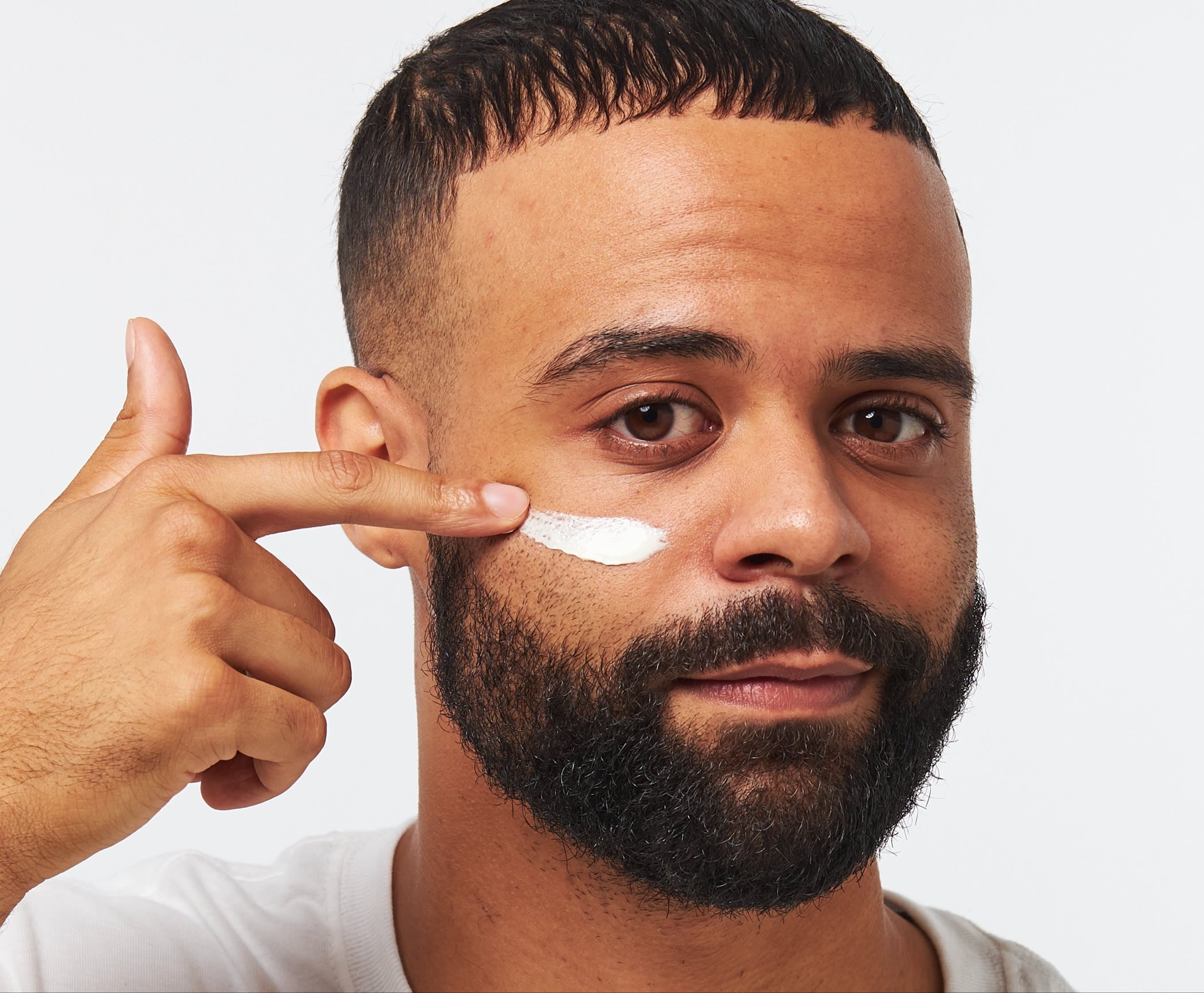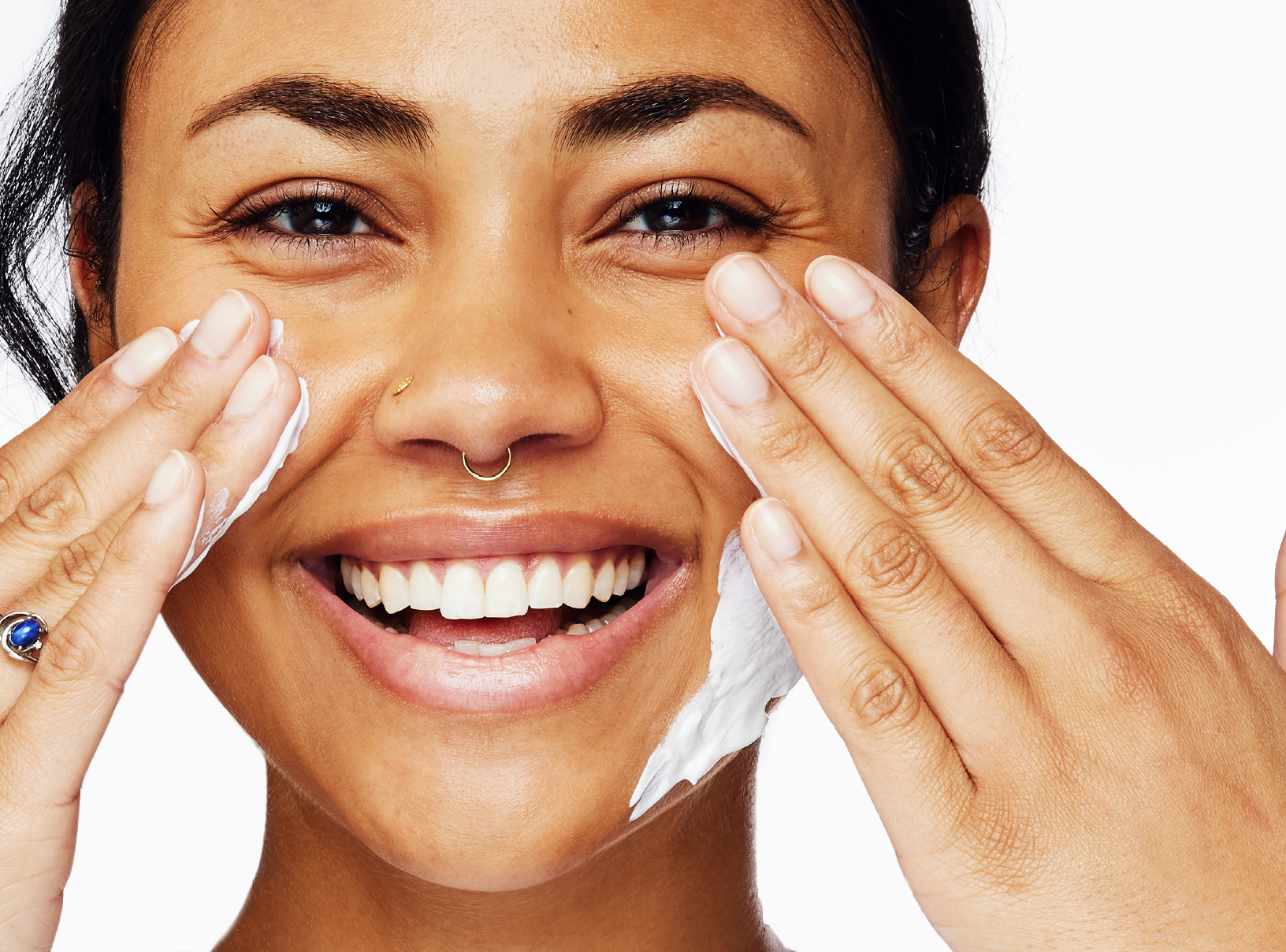Education
The Best Anti-Aging Products For Men


SHARE
Education
The Best Anti-Aging Products For Men
Medically reviewed by Katelyn Hagerty FNP
Written by Apostrophe Team
Last updated 4/5/2024
Growing older can be a mixed blessing. There’s the fun, fulfilling side, which consists of making progress, gaining wisdom, and generally, well, being an adult.
And then there’s the less fun side, which involves health checkups, injuries, and those new lines in your face when you make certain expressions. Where exactly did they come from?
While certain aspects of getting older are unavoidable, the right combination of science-backed, proven anti-aging products can help you to keep your skin healthy and look your best in every decade of your life.
Skin Aging 101: How & Why it Happens
Before we get into the most effective products for preventing and reversing the effects of aging on your skin, it’s important to explain the basics of how and why skin aging happens.
As you get older, your skin changes. It becomes thinner and less elastic, causing fine lines and wrinkles to form in certain parts of your face.
Gravity takes its toll, resulting in skin sagging that creates jowls and bags under your eyes.
Aging also changes the chemical makeup of your skin. New skin cells are created at a slower pace, less water is retained, and important structural proteins such as collagen and elastin just aren’t created as efficiently as before.
Some of this change in your skin is an intrinsic, unavoidable part of getting older. It’s a result of genetic and metabolic factors that affect everyone, albeit in slightly different ways.
Another part of this change is extrinsic, meaning it’s related to things that occur outside of your body.
Habits like smoking, not sleeping enough, or spending time in the sun without protection all play their own part in this side of the aging process.
Although some aspects of the skin aging process are unavoidable, the right anti-aging products can help to slow down the intrinsic side of aging while shielding you from the extrinsic side.
What Are the Best Men’s Anti-Aging Products?
While many anti-aging products are more hype than substance, there are several products out there that are backed up by real scientific research.
These include topical medications, over-the-counter skin care creams, and common, everyday products that help to shield your skin from environmental damage.
We’ve listed some science-backed recommendations below, along with the research on why each product (or ingredient) deserves a place in your anti-aging skincare routine.
Topical Retinoids
Topical retinoids are medications derived from vitamin A. They’re some of the most well-studied and effective medications in the world of skincare, and they’re definitely worth including in your anti-aging skincare routine.
One of the most well-known topical retinoids is tretinoin, a prescription medication that’s been used as an anti-aging treatment for several decades.
Tretinoin works by increasing the speed at which your skin produces new cells. It also unclogs your pores and promotes the shedding of old, dead skin cells that can collect on the outermost layer of your skin.
Research shows that tretinoin can improve several aspects of skin aging. It’s known to reduce fine facial wrinkles, lower hyperpigmentation (dark spots and other age-related changes in your skin tone), and give your skin a smoother, more consistent texture.
Tretinoin also works as an acne treatment, making it worth using if you’re prone to adult acne breakouts.
You can buy tretinoin as a topical cream or gel. It’s one of several ingredients you could get in your Apostrophe Anti-Aging Topical Cream, which is custom-formulated for your skin with ingredients to smooth out wrinkles and repair age-related damage to your skin.

PRESCRIPTION TRETINOIN
Target acne, dark spots, and signs of aging with this science-backed ingredient.
While tretinoin is the most effective topical retinoid, the fact that it needs a prescription may be off-putting if you’re just getting started with anti-aging skin care.
Luckily, other topical retinoids, such as adapalene and retinol, can be bought over the counter from many drug stores.
These aren’t quite as powerful as tretinoin, but still offer mild anti-aging benefits and may be a better option if you have sensitive skin.
You can find adapalene in Differin® gel and retinol in a wide range of over-the-counter creams, lotions, and other skincare products.
Moisturizer
A good quality moisturizer is one of the most powerful products available for keeping your skin healthy and slowing down the effects of aging.
Moisturizer holds water in your skin. This helps to minimize the visibility of fine lines and gives your skin a more youthful appearance.
Although most moisturizers will produce a noticeable difference in a few days, it usually takes several months for the full effects of moisturizer to become visible.
While almost all moisturizers are effective, you’ll get the best results by choosing a moisturizer that’s designed for optimal moisture retention.
If you often get dry skin, try applying moisturizer a few minutes after you finish taking a shower, bath, or washing your face. This helps to trap as much moisture in your skin as possible.
Alpha-Hydroxy & Beta-Hydroxy Acids
Alpha-hydroxy and beta-hydroxy acids, referred to as AHAs and BHAs, are common ingredients in over-the-counter anti-aging and acne treatments.
Hydroxy acids work by encouraging exfoliation, or the removal of the dead cells that build up on the outermost layer of your skin.
Popular alpha-hydroxy acids include glycolic acid, citric acid, lactic acid, and tartaric acid, while the most well-known beta-hydroxy acid is salicylic acid.
Some acids of this type are used for cosmetic peeling procedures by dermatologists and plastic surgeons, albeit at a much higher concentration than those found in over-the-counter products.
Sunscreen
While we might not think of sunscreen as an anti-aging product, the reality is that a good quality sunscreen is one of the most powerful and effective products that you can use to slow down the effects of aging on your skin.
UV radiation from sunlight can have a serious effect on your skin over the long term.
According to the Skin Cancer Foundation, as much as 90 percent of the visible change that occurs in your skin over time is caused by exposure to sunlight and ultraviolet (UV) rays.
When UV rays come into contact with your skin, they damage it at the DNA level, affecting your skin’s ability to produce important structural proteins such as collagen.
By protecting your skin from sun damage, sunscreen can stop daily UV exposure from causing you to develop wrinkles and other signs of aging.
To keep yourself protected, the American Academy of Dermatology suggests applying an SPF 30+ sunscreen that offers broad-spectrum protection whenever you spend time outdoors, even if it looks cloudy outside.
If you’re at the pool or beach, make sure to choose a water-resistant sunscreen or reapply your sunscreen after you spend time in the water.
Niacinamide
Niacinamide is a form of vitamin B3 that’s found in anti-aging creams, lotions and other topical products.
It’s included in many Apostrophe Topical Formulas, alongside ingredients like tretinoin or other powerful active ingredients.
Research shows that niacinamide can help reduce the visibility of fine lines and wrinkles, fade age spots and other common types of discoloration, increase your skin elasticity, and improve your protective skin barrier.
Niacinamide also has anti-inflammatory effects that are helpful for some skin conditions, such as rosacea and acne.
These effects can produce real, noticeable improvements in how your skin looks and functions as you age, helping you to maintain healthy, youthful skin in any decade of your life.
Caffeine
While most of us associate caffeine with the energy-boosting effects it provides in our morning coffee, it’s also a powerful skin care and anti-aging ingredient.
First, there’s some scientific evidence that caffeine may block an enzyme referred to as ataxia telangiectasia and Rad3-related (ATR), which may prevent UV-related damage from leading to skin cancer.
Second, caffeine has antioxidant properties, which may help to slow down the effects of aging on the skin.
Third, research suggests that caffeine increases microcirculation, allowing a greater amount of blood to flow to the skin.
Anti-Aging Products For Men
Although slowing down the effects of aging might seem like something that’s limited to the super wealthy, the reality is that keeping your skin youthful and healthy isn’t expensive at all when you stick to proven, science-backed products.
If you’ve recently started to notice wrinkles developing, a simple combination of a topical retinoid such as tretinoin, a moisturizer, a reliable sunscreen, and secondary ingredients like niacinamide can have a noticeable positive impact on how your skin looks.
If you’d like to get started, you can access a prescription Anti-Aging Cream through Apostrophe after an online consultation with a licensed healthcare provider.
You can also learn more about how your skin ages and the steps you can take to slow down this process in our guide to what you should know about skin aging.
15 Sources
Skin Care and Aging. (2017, October 1). Retrieved from https://www.nia.nih.gov/health/skin-care-and-aging
Zhang, S. & Duan E. (2018, May). Fighting against Skin Aging The Way from Bench to Bedside. Cell Transplantation. 27 (5), 729–738. Retrieved from https://www.ncbi.nlm.nih.gov/pmc/articles/PMC6047276/
Tretinoin Topical. (2019, March 15). Retrieved from https://medlineplus.gov/druginfo/meds/a682437.html
Zasada, M. & Budzisz, E. (2019, August). Retinoids: active molecules influencing skin structure formation in cosmetic and dermatological treatments. Advances in Dermatology and Allergology. 36 (4), 392–397. Retrieved from https://www.ncbi.nlm.nih.gov/pmc/articles/PMC6791161/
Yoham, A.L. & Casadesus, D. (2020, December 5). Tretinoin. StatPearls. Retrieved from https://www.ncbi.nlm.nih.gov/books/NBK557478/
How to Select Anti-Aging Skin Care Products. (n.d.). Retrieved from https://www.aad.org/public/everyday-care/skin-care-secrets/anti-aging/selecting-anti-aging-products
11 Ways to Reduce Premature Skin Aging. (n.d.). Retrieved from https://www.aad.org/public/everyday-care/skin-care-secrets/anti-aging/reduce-premature-aging-skin
Dermatologists’ Top Tips for Relieving Dry Skin. (n.d.). Retrieved from https://www.aad.org/public/everyday-care/skin-care-basics/dry/dermatologists-tips-relieve-dry-skin
Alpha Hydroxy Acids. (2020, August 24). Retrieved from https://www.fda.gov/cosmetics/cosmetic-ingredients/alpha-hydroxy-acids
Photoaging: What You Need to Know About the Other Kind of Aging. (2019, January 10). Retrieved from https://www.skincancer.org/blog/photoaging-what-you-need-to-know/
Sunscreen FAQs. (n.d.). Retrieved from https://www.aad.org/public/everyday-care/sun-protection/sunscreen-patients/sunscreen-faqs
Gehring, W. (2004, April). Nicotinic acid/niacinamide and the skin. Journal of Cosmetic Dermatology. 3 (2), 88-93. Retrieved from https://pubmed.ncbi.nlm.nih.gov/17147561/
Heffernan, T.P., et al. (2009, July). ATR-Chk1 pathway inhibition promotes apoptosis after UV in primary human keratinocytes: potential basis for caffeine’s UV protective effects. Journal of Investigative Dermatology. 129 (7), 1805–1815. Retrieved from https://www.ncbi.nlm.nih.gov/pmc/articles/PMC2829385/
Herman, A. & Herman, A.P. (2013). Caffeines mechanisms of action and its cosmetic use. Skin Pharmacology and Physiology. 26 (1), 8-14. Retrieved from https://pubmed.ncbi.nlm.nih.gov/23075568/
Levin, J., & Momin, S. B. (2010). How much do we really know about our favorite cosmeceutical ingredients?. The Journal of clinical and aesthetic dermatology, 3(2), 22–41. Retrieved from: https://www.ncbi.nlm.nih.gov/pmc/articles/PMC2921764/
Shop this post

Tretinoin
Like what you just read? Sign up for our email list to get the scoop on skincare science delivered straight to your inbox.

Deep Dives
A dermatologist shares his thoughts on the recent studies about benzoyl peroxide and benzene.
Read More
Education
What is milia?
What is milia? Today, we’re jumping into one type of bump that you may have heard about most commonly in infants — milia.
Read More
Education
Best moisturizer for acne-prone skin
If you have combination acne-prone skin, figuring out which moisturizer is best for your skin might be tough. In this guide, we break down the best moisturizer for combination, acne-prone skin.
Read More